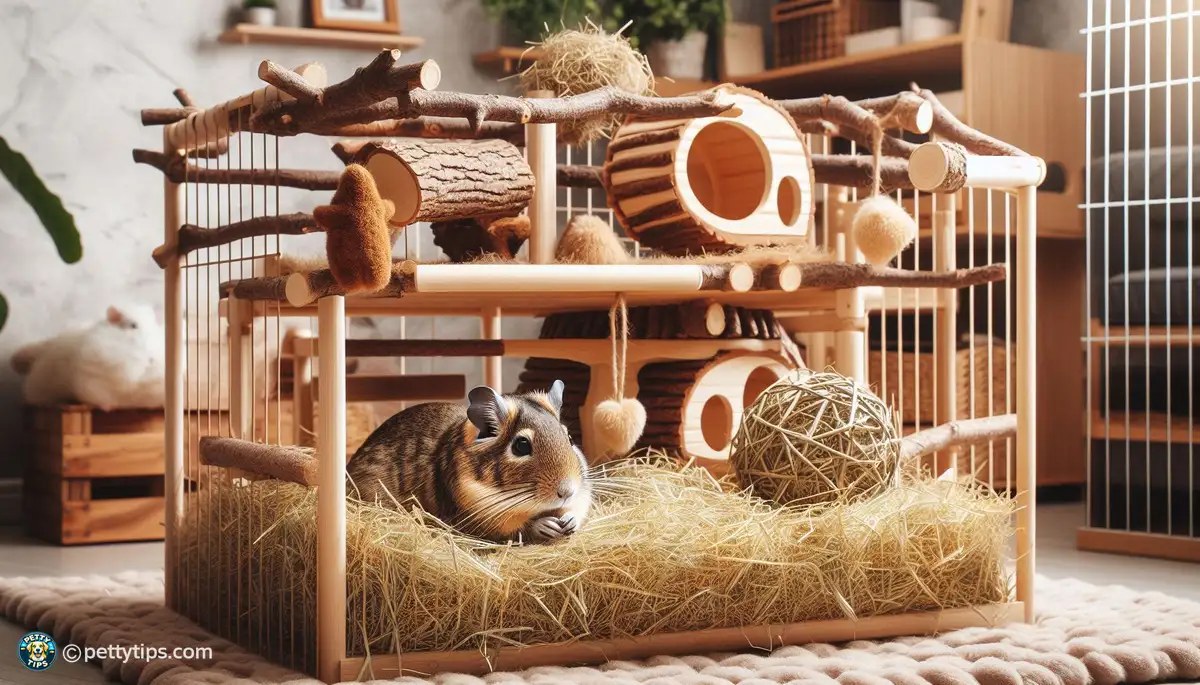- Home
- Exotic Pets
- Creating the Perfect Habitat for Your Pet Degu
Creating the Perfect Habitat for Your Pet Degu

Knowing Your Degu's Natural Habitat
Degus are lively and social rodents native to the Andes Mountains of Chile. Their natural habitat consists of rocky areas with plenty of vegetation, allowing them to burrow and explore. Mimicking this environment in captivity is crucial for their physical and mental well-being.
Temperature and Humidity Requirements
Degus are sensitive to temperature changes and thrive in a consistent environment between 65°F to 75°F (18°C to 24°C). Keep their habitat away from direct sunlight and drafts, as they prefer moderate humidity levels of around 40% to 60%.
Importance of Space and Enrichment
These active creatures love to run, jump, and climb, so a spacious habitat is essential. Provide multiple levels, platforms, and tunnels for them to explore and exercise. Enrich their environment with chew toys, wheels, and branches to satisfy their natural instincts and prevent boredom.
Choosing the Right Cage
Cage Size and Material
Opt for a large, multi-level cage made of metal bars with narrow spacing to prevent escape. A minimum cage size for a pair of degus is around 24 inches long by 24 inches wide by 36 inches tall. Ensure the cage has solid flooring to protect their delicate feet.
Easy Access and Cleaning
Select a cage with large doors or multiple access points for easy cleaning and interaction with your degus. Avoid cages with wire flooring, as it can cause foot injuries. Provide a deep layer of bedding, such as dust-free paper-based or aspen shavings, for digging and burrowing.
Location and Placement
Place the cage in a quiet area of your home, away from loud noises and excessive activity. Avoid placing it near sources of heat or cold drafts. Ensure good ventilation to maintain air quality within the habitat.
Setting Up the Habitat
Bedding and Nesting Material
Line the bottom of the cage with a generous layer of bedding, at least 3 to 4 inches deep, to provide comfort and absorb moisture. Offer nesting material such as hay, shredded paper, or tissue for them to build cozy nests.
Creating Hiding Spots and Platforms
Include hideouts and tunnels made of non-toxic materials like PVC pipes, wooden houses, or coconut hides for privacy and security. Place platforms and shelves at different heights to encourage exploration and provide resting spots.
Providing Chew Toys and Gnawing Opportunities
Degus have continuously growing teeth that require regular wear-down to prevent overgrowth. Offer a variety of safe chew toys made of untreated wood, cardboard, or hard plastic to keep their teeth healthy and entertained.
Nutrition and Hydration
Balanced Diet
Provide a balanced diet consisting of high-quality hay, fresh vegetables, and a small amount of pellets formulated specifically for degus. Avoid sugary treats and high-fat foods, as they can lead to obesity and dental problems.
Fresh Water Supply
Ensure your degus have access to fresh, clean water at all times. Use a sipper bottle attached to the cage to prevent spillage and contamination. Clean and refill the water bottle daily to maintain hygiene.
Supplemental Vitamins and Minerals
Consider offering mineral chews or mineral blocks to supplement your degus' diet with essential vitamins and minerals. Consult with a veterinarian for specific dietary recommendations based on your degus' age, health, and activity level.
Maintaining Cleanliness and Hygiene
Regular Spot Cleaning
Perform daily spot cleaning by removing soiled bedding, uneaten food, and feces from the cage. Replace dirty bedding with fresh material to maintain cleanliness and prevent odors.
Weekly Cage Maintenance
Set aside time each week for a thorough cage cleaning. Remove all items from the cage, wash them with mild soap and water, and rinse thoroughly. Allow everything to dry completely before reassembling the habitat.
Monitoring Health and Behavior
Keep a close eye on your degus' health and behavior, as changes may indicate underlying issues. Schedule regular veterinary check-ups and address any concerns promptly to ensure your degus' well-being.
Creating a Stimulating Environment
Rotating Toys and Accessories
Keep your degus engaged and stimulated by rotating their toys, accessories, and bedding regularly. Introduce new items for exploration and play to prevent boredom and encourage mental stimulation.
Interactive Playtime
Engage with your degus daily through interactive play sessions outside of their cage. Provide supervised access to a safe, degu-proofed area for exercise and socialization. bonding with your degus through gentle handling and positive interactions strengthens your relationship and promotes trust.
Environmental Enrichment
Enrich your degus' environment with natural elements like branches, rocks, and safe plants for them to investigate and interact with. Offer opportunities for foraging by hiding treats or food throughout their habitat to encourage natural behaviors.
Conclusion
Creating the perfect habitat for your pet degu requires careful consideration of their unique needs and preferences. By understanding their natural habitat, providing a spacious and enriching environment, offering a balanced diet, maintaining cleanliness and hygiene, and promoting mental stimulation and socialization, you can ensure a happy and healthy life for your furry friends. With proper care and attention, your degus will thrive in their new home, bringing joy and companionship to your life for years to come.
